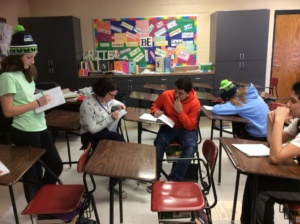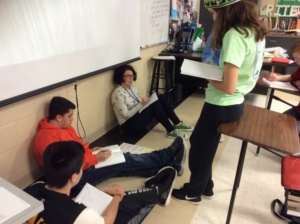Yesterday, at the annual face to face meeting for the ICTE Executive Board, podcast master Austin Hall took the time to ask each of us about memorable moments and accomplishments from this school year. One by one, my ICTE colleagues and friends shared moments of beauty and impact and learning that happened in their classrooms.
And I shared the story of when a tampon fell out of my pocket in the middle of a lesson. (One of us has to be the immature f*ck up of the English teaching world, right? That’s me!)
Now, in the clear light of a new day, I realize what the best part of my year was. It’s the same thing it has been for years.
My biggest accomplishment as a teacher this year (and every year) is that I allow my students to see me as a real writer, and sometimes it’s exhausting.
Before I took IWP Level 1 and embarked on the UNI MA: TESS* journey (side note: I firmly believe EVERY English teacher would benefit from the experience of both IWP and TESS), I spent a lot of time handcrafting perfect essay or research paper examples or mini lessons to display for my students, to show them how it should be done. A lot of teachers do this because examples are helpful. The problem, of course, was that I wasn’t showing them how to do anything. I was showing them a perfectly polished piece that an adult with English training had crafted behind closed doors until it was perfect, without showing the struggle or thought I put into it. Kelly Gallagher calls this a “Grecian Urn”: giving them an untouchable example to live up to without showing how it got to be that good (Teaching Adolescent Writers). So six years ago, I started writing with my students. I went all-in on writer’s workshop, and I didn’t let myself off the hook.
Whatever we’re working on in class, I do it too, in real time. I project my writing over AirPlay or via the document camera and tell students that if they get lost or stuck, they can take a few moments to watch what I do.
This gives me the opportunity to point out the little things that are easy for me to forget as a writer: how I every time I write I end up deleting more than I type, how I constantly stop to read and reread what I’ve already written before I know where I’m going, and how sometimes I pick a bad topic and get writer’s block. It shows my students that I’m not a perfect writer all the time (or even most of the time), but that I work at it so my writing is constantly getting better. It shows them that the first thing you put on paper isn’t necessarily the best. It also shows them that I know what I’m talking about and how to help them because I don’t sit in a palace and dictate; I do the same work I’m asking them to do.
It isn’t always easy. On Friday I started two different poetry collections with different themes. One is about appreciating “silent trophies” of success in our teaching life (thanks for the idea, Haley Moehlis!). One is about the interplay of light and darkness in my life. I’m doing research on writer’s workshop (because I run one, so it’s always good to know more). I’m writing a personal narrative on how to repair the cracks of trauma from early in life. I’m writing another about feeling inadequate in life, and how in so many moments of every day I feel like I’m just not quite good enough. I’m writing a “fan fiction” about a 7th-grade girl who asked me to figure out her love life.
By 7th period, I was dying. I was out of inspiration, I had picked a lackluster topic, and that was when I realized what a great moment for my teaching it was: kids feel the same way. It’s easy to have empathy in emotional situations, but it’s much harder when hearing yet another student complain about school or a particular assignment. Writing with my kids gives me empathy for the little things. It’s not easy what I’m asking them to do each day, and I need to remember that by experiencing it from their point of view.
It’s uncomfortable at first, to put yourself in a vulnerable position when you’re supposed to be the expert. But it’s worth it, every time. It’s made all the difference in my effectiveness as a writing teacher. My biggest accomplishment is that my students know me because I write with them, and some of them learn to love writing because they see someone who loves writing through the act of doing the work.
*Shameless plug: UNI is starting a new MA: TESS (Teaching English in Secondary Schools) cohort this summer, along with a variety of Iowa Writing Project workshops. These classes change your life, career, and students forever. The time commitment is worth it. Check out www.uni.edu/iwp for IWP course listings and registration. Look at https://continuinged.uni.edu/distance/tess for the UNI MA: TESS program information.
Missy Springsteen-Haupt teaches 7th and 8th-grade language arts at Clarion-Goldfield-Dows Middle School. She runs a writer’s workshop classroom and specializes in making everyone around her feel as awkward as she does.




















Allison Berryhill • May 1, 2017 at 6:52 am
Looks like the new me AND the old me posted the same comment. Duh.
Allison Berryhill • May 1, 2017 at 6:51 am
You inspire me in so many ways, Missy. I want to improve the quantity and QUALITY of workshopping in my classes. Once again your candor and passion are pushing me to be a better teacher. Thank you.
Allison Berryhill • May 1, 2017 at 6:50 am
You inspire me in so many ways, Missy. I want to improve the quantity and QUALITY of workshopping in my classes. Once again your candor and passion are pushing me to be a better teacher. Thank you.